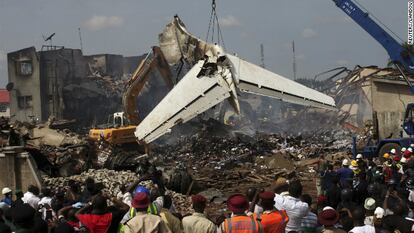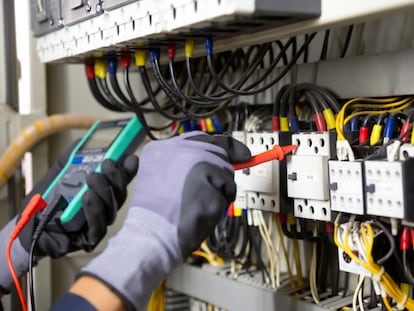Nigeria: Murder Incorporated

Autor invitado: Chido Onumah (*) Ver versión en castellano aquí
It was not until weeks after that I realized I had lost a former colleague in the Dana Air crash of June 3. It was sad enough that scores of innocent Nigerians from all walks of life died in such a gruesome circumstance. It was even sadder with the realization that someone I knew and had worked with was a victim. But in the end, are we not all victims? I shall return to this. The jury is still out on the direct and remote causes of the Dana crash. If and when the cause is known and it is evident that it was a result of negligence by the airline and complicity on the part of regulators, I do hope that the authorities will, for the sake of the precious lives lost on that fateful day, ensure that those found guilty are punished accordingly.
Very few incidents have drawn the collective angst and empathy of Nigerians as the Dana Air crash. Perhaps it had to do with the profile of the passengers in the ill-fated aircraft and the numerous human interest stories that they provoked. Perhaps, it had been a long time we witnessed a plane crash after the spate of crashes in the early and mid 2000s. But soon, all the hue and cry will die down; the matter forgotten and interred in history like the mangled bodies of the Dana crash victims.
According to experts, at 47 years, life expectancy in Nigeria is the lowest among West African countries. Recently, Dr. Abdulsalam Nasidi, a professor of Human Virology and Biotechnology and Project Director, Nigeria Centre for Disease Control (NCDC), noted: “One out of every five children dies before the age of five years due to polio and other infections. Nigeria is one of four countries where polio is still an on-going epidemic.”
Clearly, we are all victims; victims of a state that has institutionalized murder. One of the most interesting analyses I have read of the Dana crash is “Crash as Symptom” by Prof. Pat Utomi. The thrust of Utomi’s analysis is that “the (Dana) crash was only a symptom of a very deep malaise, which like cancer in metastasis has spread through every aspect of our national life. The trouble in Nigeria is our living in denial regarding the failure of the Nigerian state.”
It is sad to say, but the reality is that the Nigerian state has collapsed. And when a state fails, like in Somalia, the last thing to worry about are rules and regulations. We only need to look at our everyday life to appreciate this breakdown of law and order. Some people get uncomfortable when Nigeria is compared with other countries. I do not share such discomfiture and I shall do exactly that here because with the human and material resources that Nigeria is blessed with, there is no reason for the country to be where it is today. It does appear that our dear country is holding the rest of Africa and the Black race back.
I was recently on a study tour of Kenya under the auspices of the International Reporting Project of the Johns Hopkins University School of Advanced International Studies (SAIS) and the Bill & Melinda Gates Foundation. The trip was instructive in many ways. Kenya and Nigeria share a lot in common, particularly corruption, political violence, terrorism, and deep ethnic and cultural divisions. But Kenya is a society that realizes that it has problems and seems genuinely committed to addressing them.
I spent an afternoon looking for generators in Nairobi and my Kenyan guide, an editor at the Nation, East and Central Africa’s largest newspaper, could not contain his disbelief. My guide told me that power failure was not an issue in Kenya and therefore there was no need for generators. When I told him of the situation in Nigeria, all he could mutter was “my friend you should sack someone”. If only he knew that our power problem goes beyond sacking someone. I was to learn a few things about Kenya that further strengthened my position about the theory of the collapse of the Nigerian state. I was informed that if power would go off for as short a period as one hour, residents would be notified.
I didn’t hear the sound of siren throughout the ten days I spent in Kenya because the law only permits the president of Kenya to use siren. The other groups that are permitted this privilege are ambulances and emergency vehicles like fire trucks. This is the first lesson Kenyans are taught in driving school. In Nigeria, it is hard to keep up with the brutalities citizens suffer or the number of deaths from all manner of convoys driving at breakneck speed.
The president of Kenya, Mwai Kibaki, was recently conferred with a honourary doctorate degree from his alma mater, Makerere University, Uganda, where he graduated with a First Class Honours Degree in Economics in 1955, but he does not parade his “doctorate”. In Nigeria, every buffoon who can afford it, is “Dr. this and that”. Mr. Kibaki flies commercial planes, including Kenya Airways, one of Africa’s leading airlines with flights to almost 60 destinations world-wide. In Kenya, street lights work, roads are motorable and corruption is rife. The difference: When politicians and public servants steal public fund in Nigeria, they steal as if there is no tomorrow; as if they are colonizers.
Even though English is the official language, there is a national language (Kiswahili) in Kenya and a brand new constitution that seeks to address the many challenges of the Kenya society, including ensuring 35% gender representation. Kenya exports tea and flowers. It depends on tourism and Kenyans have managed to make the best out of this. Nigeria, on the other hand is a major oil producer, yet it imports refined petroleum products because the county’s four refineries are comatose.
By the time my guide and I had finished our comparison of Nigeria and Kenya, his conclusion was that “even in Africa, we are different”, meaning we may all be “developing countries” in the eyes of the West, but some countries have moved way ahead. I couldn’t agree more. Kenya is a modern state and for me the indicator is that it is a society with rules of engagement between citizens and between the government and the governed.
We can’t say the same for Nigeria. You have to have a functional state to make that assertion. In the 2011 budget, for example, the cost of maintaining the Nigerian Presidential Air Fleet was N18 billion ($120 million), while the budget for the entire aviation industry was N20 billion ($133 million). Is it surprising, therefore, that very little attention is paid to regulations in the aviation industry? I recently came across a National Universities Commission document that lists 44 “fake universities” in the country. That is about a third of the total number of “genuine” universities. Only in Nigeria!
I think it was the Cuban revolutionary, Fidel Castro, who once said that “in a lawless society, it is illegal to be law abiding”. Nigerians seem to have imbibed that saying. Our president says he doesn’t give a damn about publicly declaring his asset or the right of Nigerians to know his worth even if such harmless gesture can enhance transparency and transform the way we deal with corruption.
As it is in education so is it in the health sector. Even with NAFDAC, reports have it that between 70-80 percent of all the drugs sold in Nigeria are fake. It wasn’t too long ago that we were regaled with stories of how some Indian “doctors” operating high-end clinics in Abuja, the capital city, scarred and scammed Nigerian women who were “diagnosed” with fibroid. If there are fake hospitals and fake doctors parading our streets without hindrance, it follows therefore that there are fake lawmakers, teachers, policemen, judges, contractors, civil servants, etc. The bottom line is that there is no governance going on and there is no institution, from the presidency to the local government, that functions in Nigeria.
When a state neglects and murders its own citizens, it is nothing but a failed state.
(*) Onumah is a Nigerian journalist and author of the book: 'Time to Reclaim Nigeria: Essays 2001-2011'.
Tu suscripción se está usando en otro dispositivo
¿Quieres añadir otro usuario a tu suscripción?
Si continúas leyendo en este dispositivo, no se podrá leer en el otro.
FlechaTu suscripción se está usando en otro dispositivo y solo puedes acceder a EL PAÍS desde un dispositivo a la vez.
Si quieres compartir tu cuenta, cambia tu suscripción a la modalidad Premium, así podrás añadir otro usuario. Cada uno accederá con su propia cuenta de email, lo que os permitirá personalizar vuestra experiencia en EL PAÍS.
¿Tienes una suscripción de empresa? Accede aquí para contratar más cuentas.
En el caso de no saber quién está usando tu cuenta, te recomendamos cambiar tu contraseña aquí.
Si decides continuar compartiendo tu cuenta, este mensaje se mostrará en tu dispositivo y en el de la otra persona que está usando tu cuenta de forma indefinida, afectando a tu experiencia de lectura. Puedes consultar aquí los términos y condiciones de la suscripción digital.
Archivado En
Últimas noticias
Lo más visto
- Europa entra en estado de alerta ante la embestida estratégica de Trump
- Los grandes derrotados del Gordo de Navidad de Villamanín, 15 jóvenes de entre 18 y 25 años: “Hoy hemos perdido amigos”
- ¿Qué pasa si uno solo de los ganadores del Gordo de Villamanín decide denunciar?
- El PP normaliza los pactos con Vox
- El giro del PP con Vox: de prometer no gobernar con la extrema derecha a normalizarlo tras el resultado en Extremadura




























































